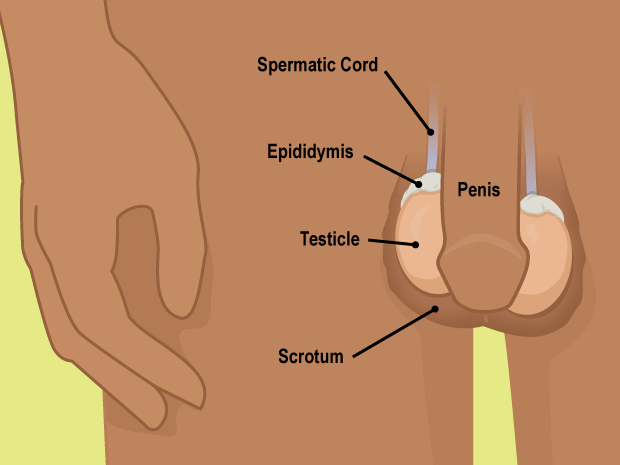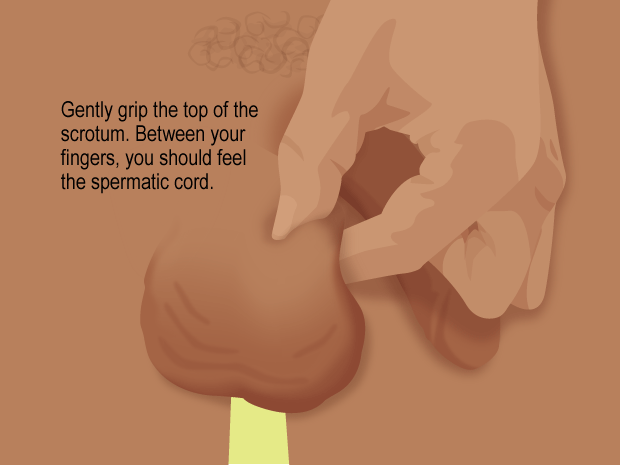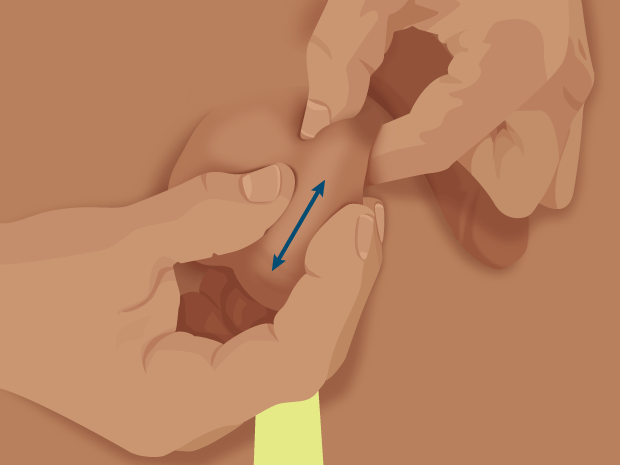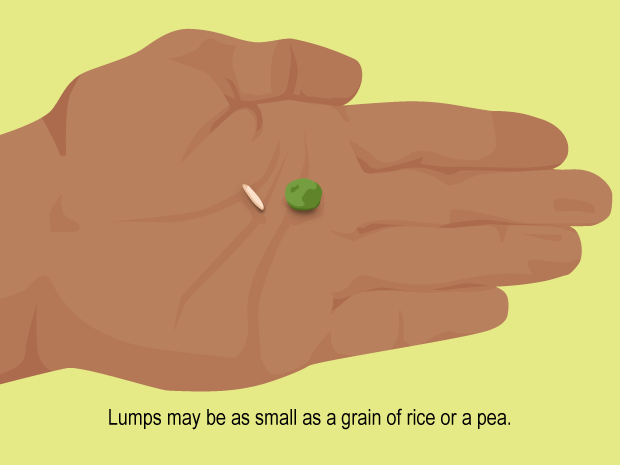- Parents Home
- Para Padres
- A to Z Dictionary
- Allergy Center
- Asthma
- Cancer
- Diabetes
- Diseases & Conditions
- Doctors & Hospitals
- Emotions & Behavior
- First Aid & Safety
- Flu (Influenza)
- Food Allergies
- General Health
- Growth & Development
- Heart Health & Conditions
- Homework Help Center
- Infections
- Newborn Care
- Nutrition & Fitness
- Play & Learn
- Pregnancy Center
- Preventing Premature Birth
- Q&A
- School & Family Life
- Sports Medicine
- Teens Home
- Para Adolescentes
- Asthma
- Be Your Best Self
- Body & Skin Care
- Cancer
- Diabetes
- Diseases & Conditions
- Drugs & Alcohol
- Flu (Influenza)
- Homework Help
- Infections
- Managing Your Weight
- Medical Care 101
- Mental Health
- Nutrition & Fitness
- Q&A
- Safety & First Aid
- School, Jobs, & Friends
- Sexual Health
- Sports Medicine
- Stress & Coping
Testicular Exams
Why Do I Need a Testicular Exam?
Medical exams are usually pretty straightforward. Many parts of the exam make sense to most guys: The scale is used to weigh you, the stethoscope is used to listen to your heartbeat.
For other parts of your body, the doctor's sense of touch and training are the key to knowing how things should feel. During the physical, the doctor will touch your belly to feel for any problems with your liver or spleen. The doc may also feel the lymph nodes in your neck, armpits, and groin to see if there is any swelling, which can indicate an infection or other problem.
The doctor also needs to touch and feel your testicles and the area around them to be sure they're developing properly and there are no problems. Two possible problems that can affect teen guys are hernias and — rarely — testicular cancer.

A testicular self-exam (TSE) is an easy way for guys to check their own testicles to make sure there aren't any unusual lumps or bumps, which can be the first sign of testicular cancer.
Try to do a TSE every month so you become familiar with the size and shape of your testicles. This makes it easier to tell if something feels different or abnormal down there.

Step 1: Getting Started
Choose the right time to do your exam. It's best to do it during or just after a hot shower or bath.
The scrotum (skin that covers the testicles) is most relaxed then, which makes it easier to feel the testicles for lumps.
Lumps may be as small as a piece of rice or a pea.

Step 2: Place Your Hand
Examine one testicle at a time.
Start by gently gripping the top of the scrotum, with your thumb on top and your fingers underneath. Pinch gently so that the testicle stays put and won't move during the exam.
Between your fingers, you should feel the spermatic cord. This connects the testicle to the rest of your body.

Step 3: Feel for Lumps
With your free hand, glide your thumb and fingers along both sides of the testicle, from top to bottom. Feel for any lumps or bumps.
Then, glide your fingers over the front and back of the testicle.
On the back at the top, you should feel the epididymis, a tube that carries sperm. This is a normal lump and may feel tender to the touch.

Tell your doctor right away if you notice any swelling, lumps, or changes in the size or color of a testicle. Also tell your doctor if you have any pain or achy areas in your groin.
Lumps or swelling may not be cancer, but they should be checked by your doctor as soon as possible.
Testicular cancer is almost always curable if it is caught and treated early.
What Are Hernias?
A hernia is when a part of the intestine pushes out from the abdomen and into the groin or scrotum (the sac of skin that the testicles hang in). Most hernias happen because of a weakness in the abdominal wall that the person was born with. If a piece of intestine becomes trapped in the scrotum, it can cut off the blood supply to the intestine and cause serious problems if the situation isn't quickly corrected.
A doctor can feel for a hernia by using his or her fingers to examine the area around the groin and testicles. The doctor may ask you to cough while pressing on or feeling the area. Sometimes, the hernia causes a bulge that the doctor can detect. If this happens, surgery almost always repairs the hernia completely.
What Is Testicular Cancer?
Testicular cancer is unusual in teen guys, but it can happen. Testicular cancer is the most common cancer in guys aged 20 to 34, though — a good reason to get in the habit of regular testicular exams.
What Happens During a Testicular Exam?
Your doctor should examine your testicles at least once a year. He or she will grasp one testicle at a time, rolling it gently between the thumb and first finger to feel for lumps. The doctor will also feel if the testicle is hardened or enlarged.
The doctor will teach you how to do testicular self-exams. Examine yourself at least once a month for any lumps or bumps on your testicles. Knowing how your testicles feel when they're healthy will help you know when something feels different down there. Noticing any new testicular lumps or bumps as soon as possible gives the best chances for survival and total cure if it turns out to be cancer.
Even though it might feel weird to have your testicles checked out, it's no big deal to the doctor. Sometimes when a doctor is examining that area, you might get an erection — this is something you can't control. It's a normal reaction that happens often during genital exams on guys. It won't upset or bother the doctor, so there's no need to feel embarrassed.
- Why Does the Doctor Have to Examine My Testicles?
- How to Do a Testicular Self-Exam (Slideshow)
- What Should I Do About Lumps in My Testicles?
- Is It Normal for One Testicle to Be Bigger?
- Gynecomastia
- Hernias
- Varicocele
- Is It Normal to Get Erections?
- Testicular Injuries
- Testicular Torsion
- STDs (Sexually Transmitted Diseases)
- Is My Penis Normal?
- Male Reproductive System

© 1995- The Nemours Foundation. KidsHealth® is a registered trademark of The Nemours Foundation. All rights reserved.
Images sourced by The Nemours Foundation and Getty Images.